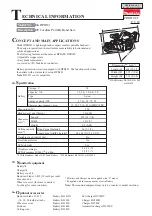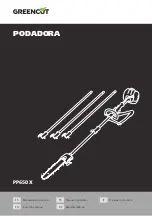
32
33
DRESS FOR SAFETY
Any power tool can throw
foreign objects into the eyes.
This can result in permanent eye
damage. Everyday eyeglasses have
only impact resistant lenses and are not
safety glasses. Glasses or goggles not
in compliance with ANSI Z87.1 could
seriously injure you when they break.
●
Do not wear loose clothing, gloves,
neckties or jewelry (rings, watches).
They can get caught and draw you
into moving parts.
●
Wear non-slip footwear.
●
Tie back long hair.
●
Roll long sleeves above the elbow.
●
Noise levels vary widely. To avoid
possible hearing damage, wear ear
plugs when using any miter saw.
●
For dusty operations, wear a dust
mask along with safety goggles.
INSPECT YOUR WORKPIECE
●
Make sure there are no nails or
foreign objects in the part of the
workpiece being cut.
●
Plan your work to avoid small pieces
that may bind or are too small to
clamp and hold securely.
●
Plan the way you will grasp the
workpiece from start to finish. Avoid
awkward operations and hand
positions. A sudden slip could cause
your fingers or hand to move into
the blade.
DO NOT OVER-REACH
Keep good footing and balance. Keep
your face and body to one side, out of
the line of a possible kickback. NEVER
stand in the line of the blade.
Never cut freehand:
●
Brace your workpiece firmly against
the fence and table stop so it will
not rock or twist during the cut.
●
Make sure there is no debris
between the workpiece and the
table or fence.
●
Make sure there are no gaps
between the workpiece, fence and
table that will let the workpiece shift
after it is cut.
●
Keep the cut off piece free to
move sideways after it is cut off.
Otherwise, it could get wedged
against the blade and thrown
violently.
●
Only the workpiece should be on
the saw table.
●
Secure work. Use clamps or a vice
to help hold the work when it’s
practical.
USE EXTRA CAUTION WITH LARGE
OR ODD SHAPED WORKPIECES.
●
Use extra supports (tables,
sawhorses, blocks, etc.) for
workpieces large enough to tip.
●
Never use another person as a
substitute for a table extension, or as
an additional support for a workpiece
that is longer or wider than the basic
miter saw table, or to help feed,
support, or pull the workpiece.
●
Do not use this saw to cut small
pieces. If the workpiece being cut
would cause your hand or fingers to
be within 7-1/2 in. of the saw blade
the workpiece is too small. Keep
hands and fingers out of the “no
hands zone” area marked on the
saw table.
















































